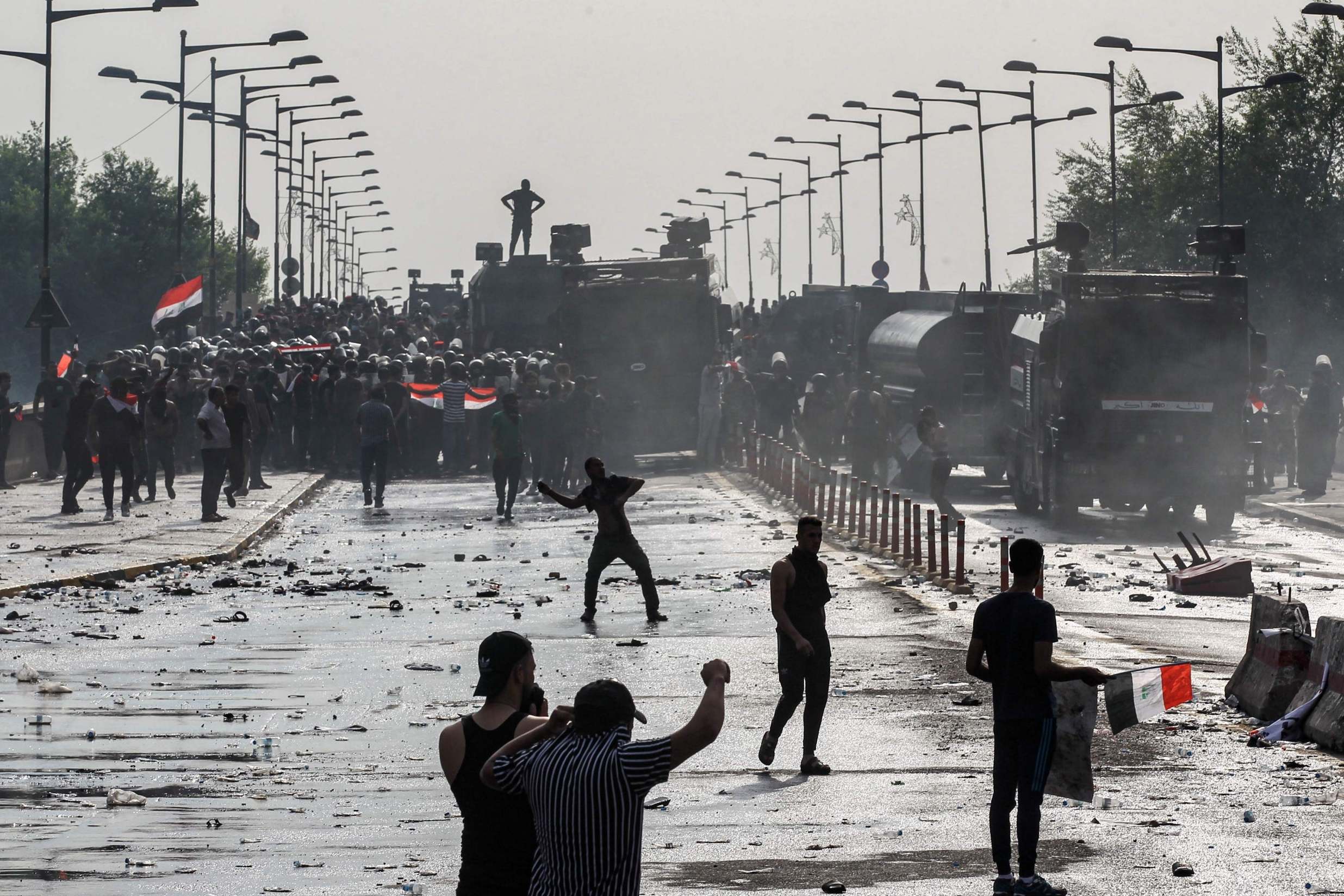Baghdad protests: At least ‘10 dead and more than 200 injured’ as riot police open fire
Thousands of Iraqis demonstrating against unemployment, government corruption and poor services

Your support helps us to tell the story
From reproductive rights to climate change to Big Tech, The Independent is on the ground when the story is developing. Whether it's investigating the financials of Elon Musk's pro-Trump PAC or producing our latest documentary, 'The A Word', which shines a light on the American women fighting for reproductive rights, we know how important it is to parse out the facts from the messaging.
At such a critical moment in US history, we need reporters on the ground. Your donation allows us to keep sending journalists to speak to both sides of the story.
The Independent is trusted by Americans across the entire political spectrum. And unlike many other quality news outlets, we choose not to lock Americans out of our reporting and analysis with paywalls. We believe quality journalism should be available to everyone, paid for by those who can afford it.
Your support makes all the difference.Security forces opened fire on protesters in central Baghdad on Tuesday evening, with some witnesses saying more than 10 people had been killed and some 286 wounded.
Riot police used live rounds as well as stun grenades and rubber bullets to stop demonstrators from crossing a bridge over the Tigris River to the Green Zone from Tahrir Square, where they had been protesting against unemployment, government corruption, and lack of electricity and water. Many ministers, senior officials and government are located in the Green Zone.
A doctor at Medical City, a nearby hospital complex, told The Independent that he had seen four bodies, but that the total number of dead admitted to his hospital was at least 10. This figure was confirmed off the record later in the evening by a government adviser, citing a confidential news system used by government officials to which he had access.
The sound of machine gun fire could be heard rippling across the city long after darkness had fallen, with main roads closed by the security services. By 22.30 local time [19.30 GMT] shots could no longer be heard and sparse traffic was running
It was the worst civil violence seen in years in the Iraqi capital, although it had become well used to devastating bomb blasts that have tailed off since 2016. This year there has also been a noticeable lack of mass protests against the electricity shortage and the lack of jobs which peaked last year in Basra where protesters took over the city.
The demonstration in Baghdad on Tuesday was small by Iraqi standards – about 3,000 people – but the overreaction by the security services could lead to a new wave of demonstrations in the next few days. It may be that the government is minimising casualty figures in order to avoid a popular backlash.
As people converged on the square chanting anti-government slogans, riot policemen tried to disperse them, scattering the mostly young male protesters, some of whom covered their face with scarves. Other protesters responded by throwing stones at security forces and waved Iraqi flags above the water cannon. Young men were seen carried away, some of them bleeding.
In a tweet, the populist nationalist Shia cleric Muqtada al-Sadr called on government leaders to launch an investigation into Tuesday’s clashes. In the past tens of thousands of his followers have joined the anti-corruption protests, making it impossible for the government to suppress them.
A joint statement issued by the Iraqi interior and health ministries said two people were killed and 200 injured, including 40 members of the security forces in Baghdad and other cities. It said it “regretted” the violence that accompanied the protests in Baghdad and several other provinces, blaming “a group of rioters”, while calling for calm and restraint.
University graduates had already been demonstrating outside ministries saying that they were being denied jobs for which they were qualified. These were being given instead to candidates for their party loyalty or religion, they said. Outside the Foreign Ministry, a group of political science graduates said they had set up a small camp 43 days earlier to demand employment but had got nowhere. They were intending to join the demonstration that ended so violently on Tuesday.
The shooting of the protesters could provoke a crisis for prime minister Adel Abdul-Mahdi, who has lasted longer in office than was expected. He was already under pressure because of the dismissal last Friday of the popular army commander, and head of the Counter Terrorism Service, Lieutenant General Abdul-Wahab al-Saadi, regarded by many Iraqis as a military hero after defeating Isis in the nine-month siege of Mosul that ended in 2017. The previous prime minister, Haider al-Abadi, was badly damaged by his inability to cope with the mass protests in Basra and later lost office.
Join our commenting forum
Join thought-provoking conversations, follow other Independent readers and see their replies
Comments